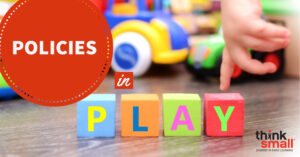The Policies in Play series takes a closer look at the recently passed state legislative policies that affect early care and education. We work with partners to find out what these policies look like in action and how they impact Minnesota children and families.
Quality child care is essential to the state’s economic viability. Every Minnesotan is touched by child care, whether directly or indirectly. Child care allows families to go to work, supports children in their development as tomorrow’s workforce, and is a network of small businesses that span  all geographical, economic and cultural communities in Minnesota. Child care is a foundational element that creates the space for our state’s economy to thrive. At Think Small we believe that by prioritizing investments in both access to high quality and capacity building of the sector, we will be able to strengthen child care business and increase availability for Minnesota’s young families. In doing so we will also achieve a triple bottom line:
all geographical, economic and cultural communities in Minnesota. Child care is a foundational element that creates the space for our state’s economy to thrive. At Think Small we believe that by prioritizing investments in both access to high quality and capacity building of the sector, we will be able to strengthen child care business and increase availability for Minnesota’s young families. In doing so we will also achieve a triple bottom line:
- supporting the economy by boosting the business of child care,
- supporting employment for parents and families, and
- supporting young children by preparing them for success in kindergarten and beyond.
Supporting the economy by boosting the business of child careThere are numerous contributing factors to the decline of child care in Minnesota. These include child care providers retiring and lack of public investments. Within the larger early learning field, high turnover is overwhelmingly attributed to both low wages and high costs of business. The shortage of available child care is in large part due to the mass exodus of child care providers who simply cannot make a living in the industry. Regardless of the reasons, when child care providers decide to close their businesses, there are economic impacts. These closures especially hurt working class families, for whom family child care is the best option. In addition to offering a much-needed service, these small businesses are a key part of Minnesota’s economy. Most child care programs are small businesses that are owned and operated by women. If we boost their businesses, we are also effectively fostering women’s economic growth and development.Supporting employment for parents and families
In Minnesota, 74% of children under age six have both parents working–one of the highest rates in the country. One in five low-income parents statewide report that child-care problems have kept them from getting or keeping a job in a given year. The lack of adequate high-quality child care within any community makes it difficult for employers to attract and retain qualified workers. The number one reason for absenteeism in employment usually involves some issue with child care. By supporting additional pathways for increased capacity in family child care, we are strengthening the economy as well. Business performance improves when parents and families are able to consistently report to work.Supporting young childrenMinnesota has a reputation for educational excellence. However, according to the Minnesota Department of Education, about half of the children entering kindergarten are not fully prepared for school. We have one of the worst educational achievement gaps in the nation among children of color. In order to help close the gaps that exist, Minnesota developed Parent Aware, a quality rating and improvement system to enable families to find the quality care and early education their children need and to help providers prepare children for kindergarten. By emphasizing and supporting high-quality child care, the field helps two generations at once.In Minnesota we have many of the pieces in place to provide child care infrastructure that works for children and families. What is still missing are larger investments and supports for programs and providers across the state. A concerted commitment to high-quality child care would be a commitment to supporting Minnesota’s future economic success.By Cisa Keller, Senior Vice President of Early Childhood Quality Development at Think Small








